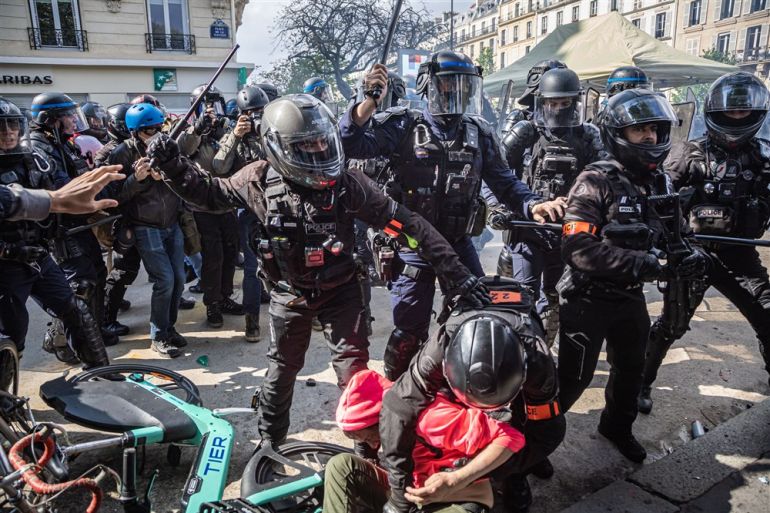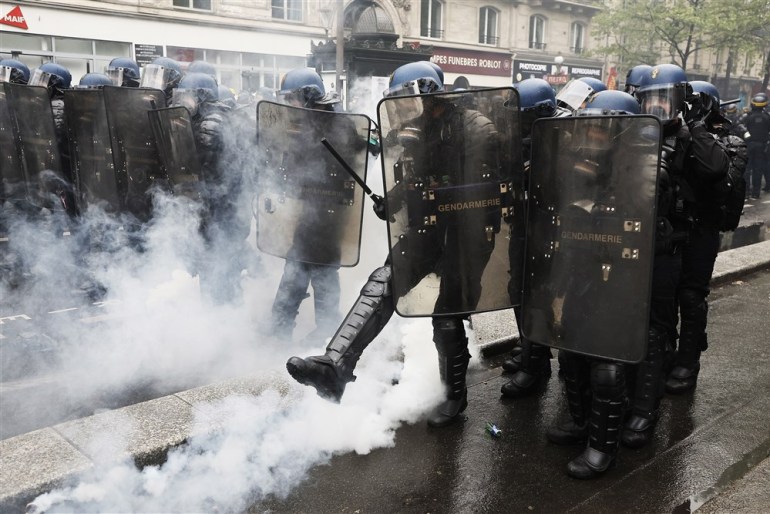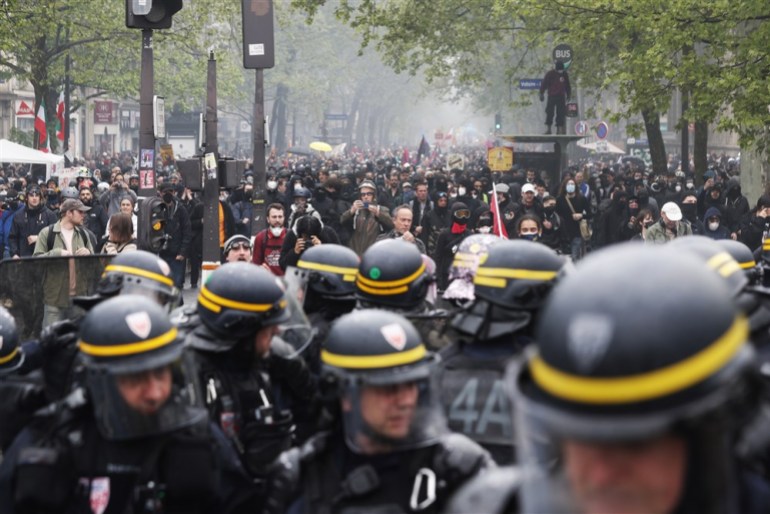Violence erupts during French May Day protests
Nearly 300 protesters arrested as more than 100 police officers wounded during protests against President Emmanuel Macron’s pension reform.

Nearly 300 protesters have been arrested and dozens of police officers were wounded after rioting broke out during May Day protests in France against President Emmanuel Macron’s pension reform.
At least 108 police were wounded, 25 in the capital, and 291 people detained across France as violence erupted in several cities on the sidelines of the main union-led marches, Interior Minister Gerald Darmanin told reporters on Monday.
Keep reading
list of 4 itemsAre Macron’s pension reform plans unfair to French workers?
Photos: Nearly one million French march on fourth day of protests
Macron signs France pension reform into law despite protests
Darmanin added that such a high toll of police wounded was “extremely rare” for a May 1 protest day. He said one policeman who was hit by a Molotov cocktail had received burns to the face and hands but his life was not in danger.
Protesters clashed with security forces across France on Monday as hundreds of thousands of people took to the streets for Labour Day to vent their anger against President Macron, who last month signed a law to raise the retirement age from 62 to 64, despite months of strikes.
Unions had been hoping for a vast turnout nationwide to further rattle Macron, who has been greeted by pot-bashing and jeers as he toured the country seeking to defend the reforms and relaunch his second term.
Video footage from various cities showed massive damage to property. In the capital and other major cities, police used drones for the first time to monitor the situation.

Some 782,000 people participate in protests
Some 782,000 people protested across France, including 112,000 in Paris alone, the interior ministry said. The CGT union said it counted 2.3 million protesters across France, including 550,000 in the capital.
The turnout was massively higher than May Day last year, but smaller than the biggest protests seen against the pension reform this year.
In Paris, radical protesters threw projectiles at police and broke windows of businesses such as banks and estate agents, with security forces responding with tear gas and water cannon, AFP correspondents said.
Darmanin condemned protesters he described as being from the far left, known as “black blocs,” saying they numbered around 2,000 in Paris and another 1,000 in Lyon. He urged that “those who attacked the police and public property be severely punished”.
Security forces deployed tear gas in Toulouse in southern France as tensions erupted during demonstrations, while four cars were set on fire in the southeastern city of Lyon.
In the western city of Nantes, police also fired tear gas after protesters hurled projectiles, AFP correspondents said. The windows of a Uniqlo clothing store were smashed.
Protesters briefly occupied the luxury InterContinental hotel in the southern city of Marseille, breaking flowerpots and damaging furniture.

Prime Minister Elisabeth Borne condemned the violence, saying it was unacceptable. She expressed support for the forces of law and order.
Macron and his government have tried to move on from the months of popular discontent, hoping to relaunch his second term after the reform was signed into law.
“The page is not going to be turned as long as there is no withdrawal of this pension reform. The determination to win is intact,” said CGT chief Sophie Binet at the Paris protest.
“The mobilisation is still very, very strong,” added Laurent Berger, head of the CFDT union.
“It is a sign that resentment and anger are not diminishing.”
Monday marked the first time since 2009 that all eight of France’s main unions joined in calling for protests.
France has been rocked by a dozen days of nationwide strikes and protests against Macron and his pension changes since mid-January, some of which have turned violent.
When Macron attended the final of the French football cup on Saturday, he was met with activists waving red cards.
Almost three in four French people were unhappy with Macron, a survey by the IFOP polling group found last month.
In the Place de la Republique where the Paris march started, a huge vest with the slogan “Macron resign” was fixed to the giant statue symbolising the French republic at its centre.
“The law has been passed but has not been accepted, there is a desire to show discontent peacefully to have a reaction in response that shows a certain level of decency,” said Celine Bertoni, 37, an academic in the central city of Clermont-Ferrand.